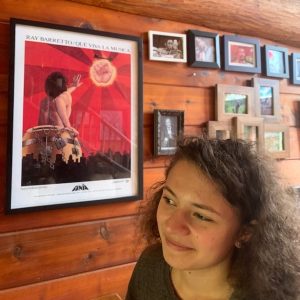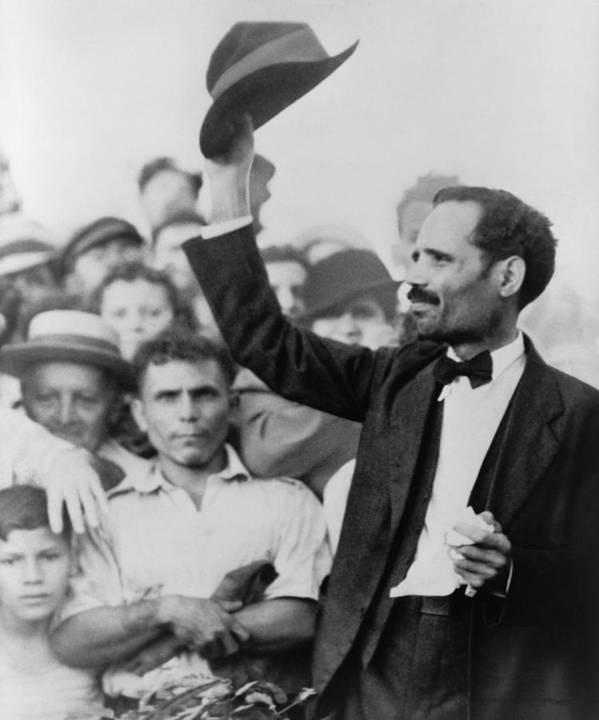Inspiration doesn’t strike on demand and poems do not appear just because you want them to. This one is no exception. Over the past few years I yearned to write a poem about Don Pedro Albizu Campos, I even wrote a few that were reasonably good. However none captured the essence of one of the most incredible things about the remarkable Puerto Rican liberator; the power of his voice. It was something that had captivated me from the moment I heard it. What I heard was something between a thunderstorm and a gentle murmur in summer grass, a hurricane and a warm breeze. I can really find no better way to describe it than the essence or Boricua soul and the collective voice of resistance of ancestors that refused to be broken and humiliated. He spoke with such confidence in the greatness of the Puerto Rican Nation, one who truly listens cannot help but be overcome with incredible pride. On one occasion thousands stood in the pouring rain for more than two hours as he spoke. Many would remember that he spoke with an “electric, almost religious fervor” 1 that captivated people. So after years of trying to capture exactly that in a poem, it finally came to me with such ease one evening earlier this month; single line that expressed that which I was struggling to convey, “his voice was more of a storm than a man”.
His voice was more of a storm than a man a voice that came from the depths of volcanic soil personified indignation of ancestors words that flew like lightning bolts or maybe like birds words that shake us to our core like thunder giant tambores played by a force of nature the fury of a huracán the force of wind that shakes a forest or an empire wind that tears down veils, earth that trembles to break chains wind that carries away the misery of colonialism wind that still blows softly like a murmur in the trees A voice of collective resistance A Grito that could shake an empire to its very foundation a Grito with a force of Betances with a force of of Hostos with a force of Lola de Tio with a force of Agüeybaná with a force of Hatuey with a force of Bolívar with a force of Taino ancestors and enslaved African ancestors A grito of those who refused to be kicked, humiliated, succumb to the worst disease His voice was more a storm than a man but soft like song birds, gentle warm breezes of Ponce imbued with love and truth yet with the power of an earthquake The man we call ‘El Maestro’ Don Pedro The man with a force of spirit and earth The man with a voice of storms and songbirds earthquakes and warm breezes hurricanes, ocean waves and the essence of Boricua soul 5 June 2023 Anani Kaike
Betances: refers to Ramón Emeterio Betances (1827-1898) known as “El Padre de la Patria” and “El Padre de los Pobres” (“the father of the country” and “the father of the poor”). He was a Puerto Rican revolutionary, organizer of El Grito de Lares, abolitionist and medical doctor.
Hostos: refers to Eugenio Maria de Hostos (1839-1903) known as “El Gran Ciudadano de las Americas”. He was a Puerto Rican independence advocate, lawyer, educator, novelist, sociologist and philosopher.
Lola de Tio: refers to Lola Rodríguez de Tio (1843-1924) Puerto Rican independence advocate, poet, abolitionist, advocate for women’s rights and writer of the original, revolutionary version of Puerto Rico’s anthem, ‘La Borinquena’.
Agüeybaná: refers to Taíno cacique Agüeybaná II (El Bravo) (c. 1470-1511) who led the Taino rebellion of 1511 against the Spanish conquistadors and was killed in battle with them after being betrayed by his sister.
Hatuey: refers to Taíno cacique Hatuey (c. 1478-1512) known as “Cuba’s First National Hero” who traveled from his homeland, Quisqueya (the Dominican Republic) to Cuba and waged guerilla warfare against the conquistadors before he was burned alive after refusing to be converted to christianity.
Bolívar: refers to Simón Bolívar (1783-1830) known as “the Liberator” who liberated the present-day countries of Venezuela, Panama, Colombia, Peru, Bolivia and Ecuador from Spanish rule. He served as the 1st president of Colombia, 6th president of Peru and 1st president of Bolivia.
- Denis p. 117

